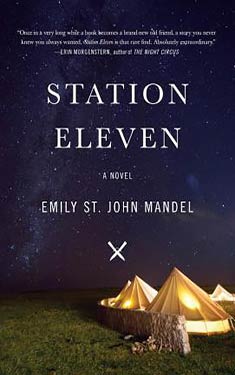Emily St. John Mandel
Completed 5/13/2015, Reviewed 5/21/2015
5 stars
I have been reading way too many apocalyptic novels
lately. “Station Eleven” is another
one. The world comes to a screeching
halt when the Georgia flu nearly wipes out the human population in a few
weeks. One young survivor, Kirsten
Raymonde, is part of a travelling theater and orchestra, bringing rare moments
of happiness to the enclaves left in the aftermath of the flu. After becoming separated from the group, she
is hunted by the leader of a dangerous cult.
This is just the barest of summaries of the book. It’s actually much more, reminding me of the multithreaded
films “Babel” and “Amores Peros” by Alejandro
González Iñárritu, filled with the intertwining stories of multiple people
before and after apocalypse comes. It
was riveting, and like a great end-of-the-world story, it made me have to
regularly stop, take deep breaths, walk around, and remind myself that “it’s
only a story”.
It’s hard to say that the main plot follows Kirsten, because
there is another major character, Arthur Leander, a former Hollywood star who
dies onstage in the 4th act of King Lear just as the Georgia flu
breaks out in North America. Kirsten is
a child actress in the play, and though we follow her travels twenty years
later, the story bounces around, revealing Arthur’s past and the pre- and
post-apocalyptic lives of some of the people with whom he came in contact. The beauty of the book is in this bouncing
device. It reveals the course of the
epidemic, adds insight to the characters, and creates surprising connections.
If the book is about anything, it’s about the need for art
and culture to give meaning to our lives, even if it’s bad culture. Kirsten carries with her two comic books in
the “Station Eleven” series. There’s no
author, only initials. And none of the
survivors have ever heard of it. She
reads them over and over, finding solace in their stories. She also collects clippings of Arthur from
tabloid magazines that she comes across in her travels with her company. Her obsession with him stems from his
kindness to her right before he died.
Having been only eight years old when the flu struck, these are the few
connections to the past that give meaning to her present. However in an ironic twist, one of the things
that brings joy to Kirsten spurs another character into a world of evil.
As I mentioned at the beginning, reading a lot of end of the
world scenarios has really affected me. It
makes me wonder if my love of the book was predetermined by the compounding
effect of “The Last Policeman” trilogy and “Alas Babylon. And I’ve always been a sucker for good
disaster porn (Irwin Allen was one of my childhood favorites). But unlike “The Towering Inferno”,
“Armageddon”, and “2012”, this isn’t soapy or silly. It’s never melodramatic. It’s a character study of ordinary people in
extraordinary times. It left me very
shaken and wearily exhilarated. Five
stars out of 5.

great review. I enjoyed the book awhile back when i read it though. I just re-read The Postman after 20+ years; another post apocalypse story. I had forgotten much of the book and just how good it was.
ReplyDeletei have no idea how that came up as a reply from Steve to Steve ?????
Delete